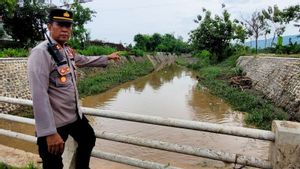YOGYAKARTA - Dengue hemorrhagic fever (DHF) is one of the diseases that needs to be watched out for during the rainy season. This disease can attack anyone, both children and adults. Although initially it only showed ordinary symptoms, but if not treated immediately it could cause serious health problems or worse.
Dengue fever is caused by dengue virus which is spread through the bite of the Aedes mosquito on the human body. Cases of dengue disease always increase during the rainy season, where humid environments and puddles support the breeding of this type of mosquito.
For those of you who live in a humid environment or a lot of puddles, it is important to protect yourself from the risk of dengue disease. So what are the symptoms of dengue fever in adults and how to treat them?
Dengue fever is transmitted by mosquitoes infected with dengue virus. When mosquitoes of Aedes Aegypti and Aedes albopictus bite the human body, it can cause dengue disease. Through the mosquito intermediary, the virus will move to the human body.
The virus that causes dengue disease spread by mosquitoes will enter the incubation period in the human body. The length of the incubation period is 4 to 10 days before the symptoms of infection appear in the sufferer.
Before entering the dengue phase, patients usually experience high fever suddenly. This fever disorder can reach temperatures above 38 degrees Celsius. In this phase known as dengue fever, sufferers will experience health problems until their immune system decreases drastically.
This early symptoms of dengue fever usually lasts on the first 1-2 days. The fever condition will drop on the 3rd day, but it is necessary to be aware that the next day until the 5th day is a critical period. After the fever drops, there may be a leak of fluid from the blood vessels accompanied by a decrease in the value of platelets.
When a blood vessel is damaged or leaks, the sufferer will experience severe dengue fever. This condition must be treated quickly and appropriately because it risks causing the sufferer to experience internal bleeding, organ failure, and death.
SEE ALSO:
Sometimes adults ignore health symptoms because they are considered as fever or common cold. Even though the symptoms experienced could be signs of dengue fever. Although initially in the form of a common dengue fever, over time it can develop into a dangerous dengue hemorrhagic fever (DHF).
The main characteristics of dengue fever in adults are characterized by a temperature fever of 38 degrees C. In addition, patients will usually feel other symptoms as follows:
Symptoms of the above mild hemorrhagic fever will usually recover within a week. Meanwhile, in some cases dengue fever can develop more severe or more severe when it is late or not treated immediately.
Severe dengue fever conditions can occur when a blood vessel is damaged and leaks and an internal bleeding. The following are signs and symptoms experienced when bleeding internal organs:
The treatment of dengue fever is carried out in accordance with the phase of the disease experienced by the sufferer. Here are some tips for treating dengue fever in internal adults who are still in the early stages:
Those are the characteristics of dengue fever in adults who need to be watched out for in the rainy season. If you experience a number of symptoms above, then you should immediately do the right treatment or consult a doctor. Also read the critical symptoms of DB in children.
Stay up to date with the latest domestic and other overseas news on VOI. We present the latest and most updated nationally and internationally.
The English, Chinese, Japanese, Arabic, and French versions are automatically generated by the AI. So there may still be inaccuracies in translating, please always see Indonesian as our main language. (system supported by DigitalSiber.id)













